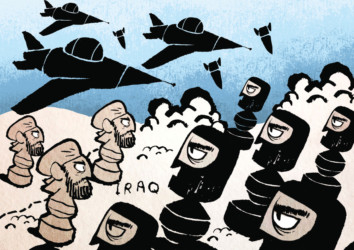
The new Iraq war is into its third month. It was about this far into America’s combat operations in 2003 that former president George W. Bush landed on the USS Abraham Lincoln in front of the infamous banner reading: “Mission Accomplished”. America has learnt, since then, to be humble about the progress of its wars — but, in this case, there looks little to be humble about in the first place.
The Islamist extremists of Daesh (Islamic State of Iraq and the Levant) hold a fifth of the Syrian Kurdish town of Kobani. They have swallowed up much of Iraq’s crucial Anbar province, to the west of Baghdad, and retain control of every major city they took in their summer blitzkrieg. And they have done so despite a steady stream of bombs and missiles being sent their way by America and its allies. Does that mean that the West is losing? The problem with such a conclusion is that it paves the way to knee-jerk escalation, like a gambler’s impulse to salvage his losses, rather than careful strategic thought. We should remember that this war was never about destroying Daesh — despite the histrionic language used by some politicians — but about “degrading” it, as US President Barack Obama put it, until such a time that local ground forces could take it on.
However, those local forces were, and remain, so inept, so weak and so demoralised that this was always going to be a Herculean task. In June, four entire divisions of the Iraqi army disintegrated in the face of the Daesh advance, despite the militants’ relatively feeble numbers. A team of US advisers concluded that just half of Iraq’s 50 brigades were “reputable partners”. The situation is worse in Syria, where moderate rebels have been driven to near-extinction by the terrorists and US efforts to train more will take well into next year to bear fruit. From this lamentable state of affairs, two conclusions follow. First, as Martin Dempsey, America’s top military officer, put it last month, this is “an Iraq-first strategy”. Bluntly, the intention is to save Baghdad, not Damascus. Yes, it is important to put pressure on Daesh in Syria, where their headquarters and oil fields are located — America learnt the hard way in Afghanistan about allowing an enemy to enjoy a sanctuary across the border (in Pakistan). But Syria is the rear area, not the campaign’s decisive battleground.
Second, the real strategy, though few will admit this, is containment. In this, it bears more similarities to America’s 12-year air mission over Iraq from 1991 to 2003, imposing a no-fly zone, than it does to the massive war that came thereafter. Its objectives are therefore much more modest than the immediate elimination of Daesh from the Levant.
Of course, even judged on these terms, the campaign still falls short. Although the world’s attention has been on Kobani, in Syria’s north, Daesh’s gains in Iraq’s western Anbar province are more disturbing. It took an army base at Saqlawiya last month, the town of Hit a week ago and is pushing into the crucial city of Ramadi from the west. If Anbar province were to fall, it would help Daesh connect its Syrian and Iraqi possessions and apply pressure on Baghdad itself. And yet, since the beginning of October, we have we seen fewer than 50 allied air strikes in Iraq — as opposed to more than 120 in Syria.
Bad weather in central Iraq has complicated reconnaissance operations, but one explanation for this lopsided targeting seems to be that the US felt compelled by the global outcry over Kobani to redirect its attention there. This is understandable politics, but it is terrible strategy. It puts the initiative into Daesh’s hands, allowing it to dictate America’s policy by opening up new fronts of its choosing.
Nevertheless, Kobani does show that air power is not quite as useless as some of its detractors have suggested. As Ruth Sherlock reported in the Sunday Telegraph, US air strikes hit the very centre of Kobani with unerring accuracy. Daesh appears to be withdrawing from the town: If not a defeat, then certainly a halt to its advance has been achieved. This is what containment looks like — imperfect, unsexy, but a huge improvement on what preceded it. These successful strikes were, in part, the fruit of loose coordination with Kurdish fighters on the ground; the same factor made earlier British and allied air strikes similarly effective in helping to roll back Daesh from Rabia in northern Iraq. But containing, or defeating, Daesh in Iraq is not just about the battlefield — it is also about forming a government of genuine national unity, after the autocratic regime of former Iraqi prime minister Nouri Al Maliki did so much to drive Sunnis into Daesh’s arms.
And how are those efforts going? Well, the new Iraqi Interior Minister, Mohammad Gabban, answers to an Iranian-backed Shiite militia that once ran death squads against Iraqi Sunnis and whose leader’s “preferred methods of killing allegedly involved using a power drill to pierce the skulls of his adversaries”, according to a 2009 State Department cable. America can halt Daesh’s advance, but the depth of alienation between Iraq’s Sunni minority and its Shiite majority, whose parties and militias dominate the government, is immense. Iraq’s Sunni tribes may turn to Daesh — whether independently or as part of a proposed “National Guard” programme — but it is unclear whether their long-term loyalty will lie with Baghdad.
Even if the West defeats Daesh, holding together a fragmenting Iraq may be beyond the West’s capabilities.
— The Telegraph Group Limited, London, 2014
Shashank Joshi is a Senior Fellow of the Royal United Services Institute.









